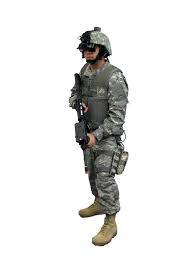soldier
英 [ˈsəʊl.dʒər]
美 [ˈsoʊl.dʒɚ]
- n. 军人;[昆] 兵蚁;懒汉;一片烤面包
- vi. 当兵;磨洋工;坚持干;假称害病
使用频率:

中文词源
soldier 战士,士兵
来自古法语 soldier,来自拉丁语 soldarius,战士,领军饷者,来自 solidus,古罗马金币,词源同 solid,完整的,纯的,纯金的。
英语词源
- soldier
-
soldier: [13] The etymological idea underlying the word soldier is the ‘pay’ received by mercenary soldiers. It was borrowed from Old French soudier or soldier, a derivative of soulde ‘pay’. This in turn went back to Latin solidus, a term used for an ancient Roman gold coin; it was short for nummus solidus, literally ‘solid coin’.
=> solid - soldier (n.)
- c. 1300, souder, from Old French soudier, soldier "one who serves in the army for pay," from Medieval Latin soldarius "a soldier" (source also of Spanish soldado, Italian soldato), literally "one having pay," from Late Latin soldum, extended sense of accusative of Latin solidus, name of a Roman gold coin (see solidus).
The -l- has been regular in English since mid-14c., in imitation of Latin. Willie and Joe always say sojer in the Bill Mauldin cartoons, and this seems to mirror 16c.-17c. spellings sojar, soger, sojour. Modern French soldat is borrowed from Italian and displaced the older French word; one of many military (and other) terms picked up during the Italian Wars in early 16c.; such as alert, arsenal, colonel, infantrie, sentinel.
Old slang names for military men circa early 19c. include mud-crusher "infantryman," cat-shooter "volunteer," fly-slicer "cavalryman," jolly gravel-grinder "marine." - soldier (v.)
- "to serve as a soldier," 1640s, from soldier (n.). Related: Soldiered; soldiering. To soldier on "persist doggedly" is attested from 1954.
权威例句
- 1. Just what the soldier was doing in Bireij is unclear.
- 就连那个士兵在比雷杰干什么都不清楚。
- 2. Jacob Sinclair met his death at the hands of a soldier.
- 雅各布·辛克莱在一名士兵的手里送了命。
- 3. George Fraser was clearly a good soldier, calm and resilient.
- 乔治·弗雷泽显然是个好士兵,沉着冷静且适应力强。
- 4. A soldier was arrested after running amok with a vehicle through Berlin.
- 一名士兵在疯狂飙车穿越柏林后被逮捕。
- 5. A soldier plunged a bayonet into his body.
- 一名士兵将刺刀插进了他的身体。
